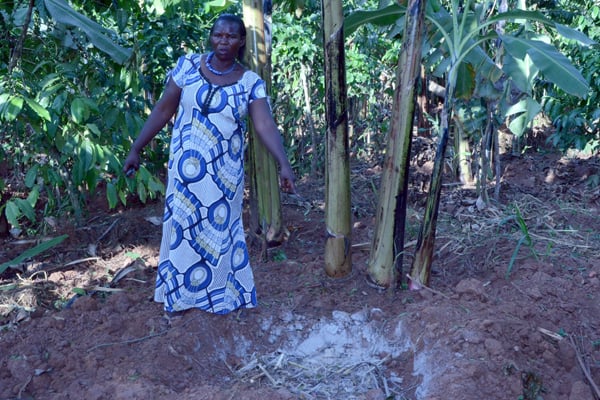Prime
Credit tips for smallholder farmers

Joseph Mutaka, the principal banking officer at Bank of Uganda encourages smallholder farmers to develop creditworthy habits. Photo | George Katongole
What you need to know:
- Banking institutions are crucial to the agricultural system because they are the engine that can get capital to where it needs to go.
For all the challenges farmers face in agriculture including seed, diseases, inadequate market and pricey inputs, at the end of the day farmers will need some form for financing.
Joseph Mutaka, the Principal Banking Officer Bank of Uganda says the Agricultural Credit Facility (ACF) unlocks access to credit in areas with communal land tenure and smallholder farmers who are otherwise excluded for lack of collateral to secure credit.
ACF which has been in operation since 2009 is aimed at de-risking the agriculture sector through financing.
“Everybody involved in the agriculture value chain should be able to access fairly cheap credit and that means short, medium or long-term capital,” he said.
As for financing challenges facing farmers across the country, financial partners to the Farm Clinic, Bank of Uganda and Stanbic Bank, offered the available affordable solutions.
The ACF is administered by the Bank of Uganda with the participating institutions. Small-scale farmers get loans of up to Shs20m with an interest rate fixed at 12 percent per annum.
Mobile tools
While Sunny Mpaka, the Branch Manager Stanbic Bank Lira reiterates the bank has financing solutions to keep agricultural businesses running.
Stanbic Bank was declared the best performing commercial bank in disseminating the government-funded ACF loans in 2019. Yet they continue to give agriculture friendly loans.
Mpaka explain that agri-finance loans targeting both large and small-scale holders can ease the burden of farming. She says that projects such as livestock farming, commodity trading, all forms of farming, machinery acquisition, factory set up, and value addition among others, are supported by the bank’s agri finance loans.
To reach the informal market, Mpaka says the bank has set up a digital wallet called FlexiPay to reach the farmers.
Other challenges facing farmers such as lack of pensionable jobs are included in the NSSF Voluntary Membership Plan. This plan provides employers and workers such as farmers not compelled by the NSSF Act the opportunity to save voluntarily for their retirement.
What banks need
Every banking institution has different banking requirements but there are general issues farmers should look out for.
Mutaka says that farmers should look out for the Cs of credit.
The five C’s of credit offer lenders a framework to evaluate a loan applicant’s creditworthiness. By considering a borrower’s character, capacity to make payments, economic conditions and available capital and collateral, banks and other financial institutions can better understand the risk a borrower possess.
Character of a farmer
A lender will look at a mortgage applicant’s overall trustworthiness, personality and credibility to determine the borrower’s character. The purpose of this is to determine whether the applicant is responsible and likely to make on-time payments on loans and other debts.

You character means who you are in terms of your integrity and ethical standing. The bank also looks at your credit history.
“We expect you access financing through the bank. Banks expect you to have a bank account which calls for a clean record. Everybody who gives you money will need to understand your character. Before you approach the bank first do some soul-searching. You should not ask money for a mill to instead divert it into marrying the second wife,” Mutaka says.
Capacity
Whether you’re applying for a business loan, mortgage or other loan, lenders want to see that you’re committed enough to contribute some of your own funds.
Mutaka says: “The bank would like to see what investment you have made personally. That means you love this project and you want it to progress. Let’s say you are doing poultry, you need to have bought the birds and have enough land. The bank will be interested in assessing how much capital you have put in as an individual.”
Capital
Capacity summarises a farmer’s ability to repay a loan based on the applicant’s available cash flow. Lenders consider whether the borrower can cover loan applications. Relevant factors include the borrower’s income and income stability.
Conditions
Lenders generally look at other financial conditions like the overall health of the economy and specifics of the loan. This typically includes the loan interest rate, amount of principal and intended use of the loan proceeds. However, lenders also consider outside factors like the state of the economy as a whole, industry trends and other conditions that might impact loan repayment.
“Is your farm eligible for getting money? Does it have the capacity to succeed when given the loan?” he asks.
Collateral
The banks will need some form of security, an asset you can pledge to them. They are not interested in taking your asset, no, it is just a cover up to show that they gave you their money and you have something that entices you to come back to them,” Mutaka explains.
If you don’t have a mortgage, Bank of Uganda offers block allocation where you can come as a registered farmer group. The bank can give you up to Shs1.5b.
“This innovation is unlocking access to credit in areas with communal land tenure and most especially, for smallholder farmers who are otherwise excluded for lack of collateral to secure credit,” Mutaka says.
Top tip
By considering a borrower’s character, capacity to make payments, economic conditions and available capital and collateral, banks and other financial institutions can better understand the risk a borrower possess.




